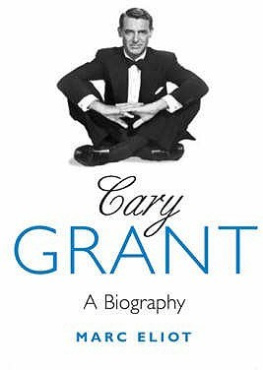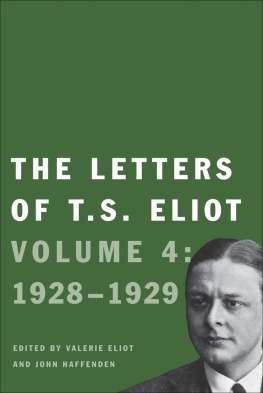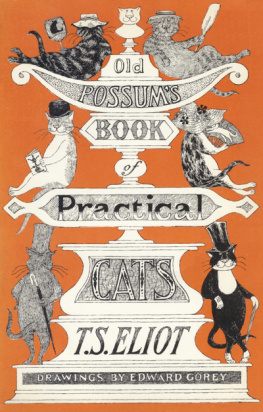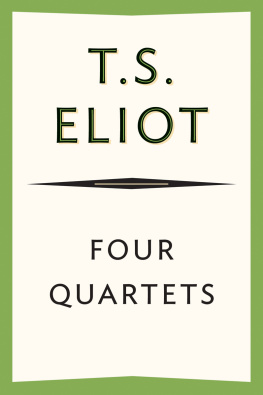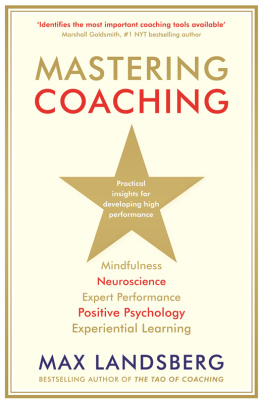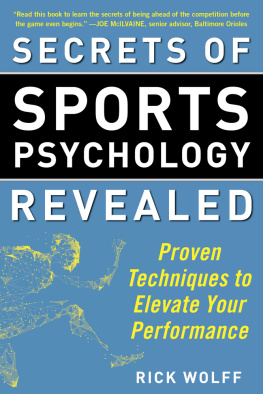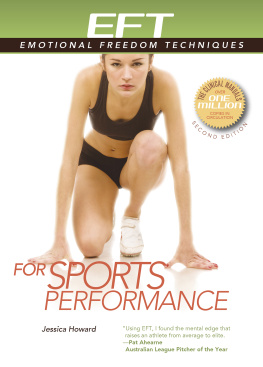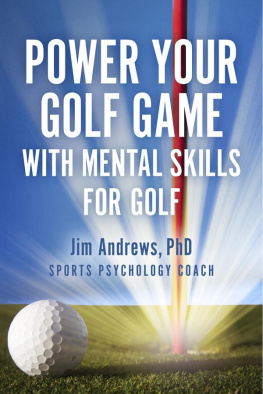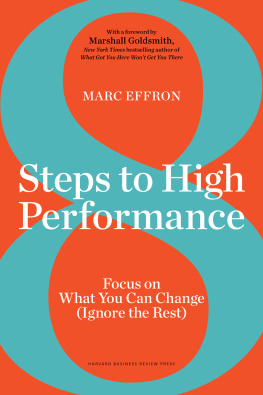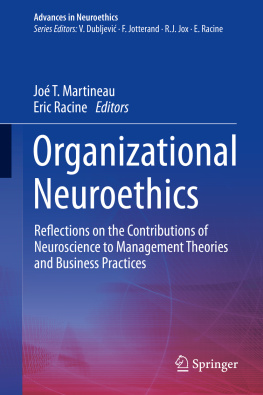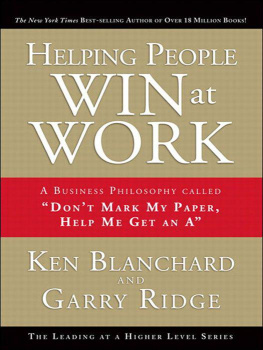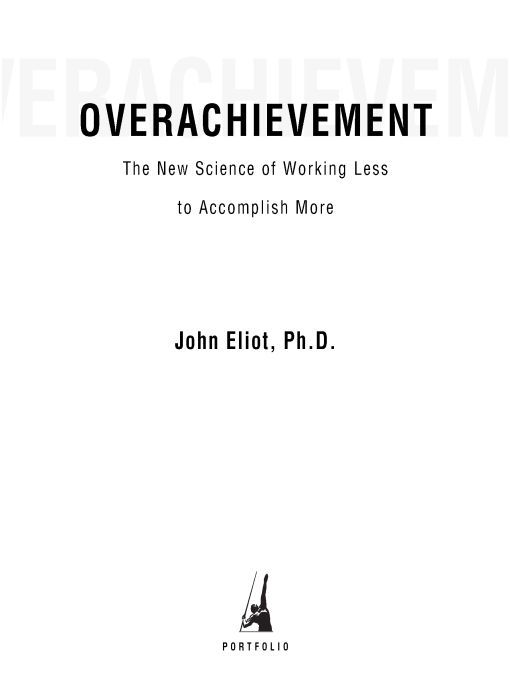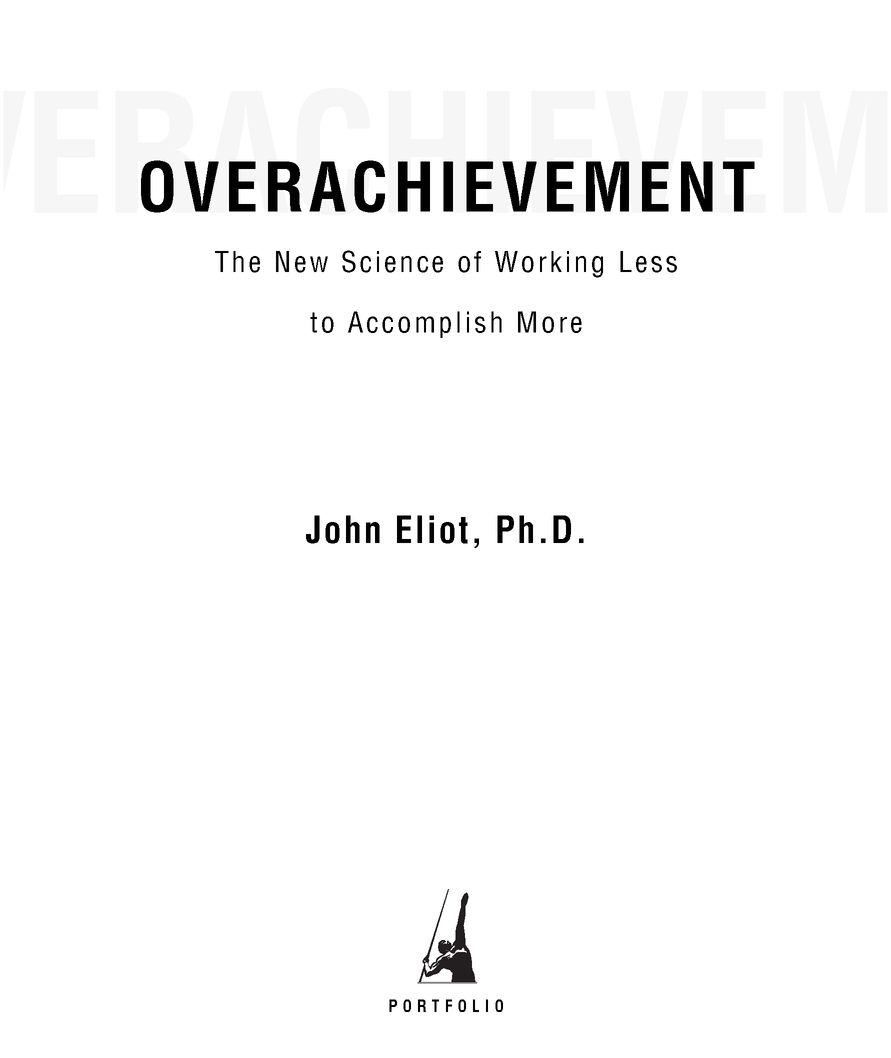Table of Contents
PORTFOLIO
OVERACHIEVEMENT
John Eliot, Ph.D., teaches business and psychology at Rice University and is adjunct professor at the University of Houston and SMU Cox School of Business Leadership Center. He is the former director of Rices program in sports management and performance enhancement. In 2000, he cofounded The Milestone Group, which provides performance evaluation and training to business executives, professional athletes, and corporations nationwide. Consulting relationships have included Merrill Lynch, Goldman Sachs, Adidas, NASA, the United States Olympic Committee, the Philadelphia Eagles, the Washington Capitols, The Mayo Clinic, M. D. Anderson Cancer Center, and hundreds of elite individual performers. Visit www.overachievement.com.
In Memory of John Sackett and Dr. Tim Simpson,
world champions and exceptional thinkers, both
Acknowledgments
When it comes to support systems, I would wager that there is no greater overachiever than me. Twists of fortune and adventure have blessed me with a truly remarkable collection of fascinating, brilliant, visionary, kindhearted, character-rich compadres. I owe unquantifiable thanks to all of them, to those I have learned from and taught, been pushed by and offered encouragement from, played alongside and battled against.
My sincerest thanks to the exceptional team behind this book:
To the exceptional thinkers who serve as vivid illustrations and lessons throughout this text. To all the coaches, executives, doctors, and performers Ive worked with. To Willis Wilson. To my students at Rice.
To renaissance man Edward Tivnan. Without Ed on board early, this project would never have gotten off the ground. His dedication to helping people through great writing is unmatched; his collaboration is indeed priceless.
To the entire all-star squad at Penguin Portfolio. To Adrian Zackheim and Will Weisser for being great thinkers and right on the cutting edge with me. To my editor, Stephanie Land, whose insight helped shape the look and feel of Overachievement, and to my assistant editor, Megan Casey.
To my incredible agent, Stephanie Kip Rostan, and everyone at the Levine-Greenberg Agency for their expertise and thoughtfulness, and for helping make this project really sing, all the way from conception to bookstore displays. To office-putting champion Jim Levine.
And finally, my profound thanks:
To my publicist David Hahn, Rick Frischman, and the out-of-the-box team at Planned Television Arts.
To Tony Apollaro and his whole peak-performing family. To John Goff, John Katen, Terry Davison. To the inspirational team at Texas Childrens. To Martyn Howgill, Dr. Kathryn Stream, Dr. Richard Wainderdi, and Dr. Rick Stasney. To Fayyadh Yusuf, LA, Chip Hay, Shaheen Ladhani, the Simon brothers, the docs from Brown (Dr. Ravi?!), the St. Kitts crew, and Doug Paige for their wit, wisdom, and impact on the world. To the Dartmouth Family and all of its far-reaching branches. To Dr. John Corson.
To Drs. Matt and Kim Combs, Paul Thomas, Fred Paine, the rest of the Blues, and of course Ernie Baker, for writing a few pages of baseball history, for the hours of BP (particularly the Scooby Snacks), and for allowing me a deep connection with the true spirit of human competition. To Kevin Costner and Roy Hobbs.
To Bob and Darlene Rotella.
To my family.
Foreword
Dr. Jane has been professor and chairman of the neurosurgery department at the University of Virginia since 1969, and has won the Cushing Medal, the highest honor granted by the American Association of Neurological Surgeons. An international figure in the field, Dr. Jane was the neurosurgeon who treated Christopher Reeve after the tragic 1995 horseback riding accident that left the actor a quadriplegic.
A decade ago, I was invited to sit on a panel at a conference on medical education. There was a large audience, perhaps a thousand people in the room. One of the big controversies of the day in medicine was on the tablethe long hours and stress that young interns and residents had to endure. The moderator asked each of us how we addressed the issue of stress in our training programs. My answer was: I try to raise the stress on my residents to the highest possible level, and if they cant take it, I fire them.
The audience was stunned. Some people began clapping, but many in the room also booed. I was not surprised. Stress and single-minded commitment to work have been demonized not just in medicine but throughout the culture. And the antistress forces seem to have won, at least in medical education. Residents are now prohibited by law from working more than eighty hours, though a hospital can petition to extend the work week another eight hours. I wish John Eliots book had been available during that conference and the subsequent wrangles over overwork among young doctors. This book is a welcome antidote to the conventional wisdom among mainstream psychologists that to perform well we must be relaxed. The good surgeon will be keyed up and full of the kind of nervous energy that is absolutely necessary to spend the hours required to focus on a complicated surgeryand to deal with every possible contingency.
John Eliot knows this. As a psychology academic and college teacher, he is familiar with the extraordinary progress thats been made in the field of neuroscience. Much of his own field research on high performers was done watching surgeons work and talking to them about how they thought under pressure (including me, I might add, in the interest of full disclosure). He also spends considerable time these days advising athletes, musicians, and businesspeople on how to transform their talent and training into great work. Dr. Eliot understands why stress is a good thing. He also understands that to be good at surgeryand just about every other complicated career and task under the sunrequires not just training in various techniques but also training in how to use the mind. I agree. My job as a professor of neurosurgery is to teach accomplished and supremely talented young doctors how to think under the gun and in the face of extreme adversity. I do so by creating as tough an environment as possible. If youre training top gun pilots, you dont make things easy for them.
The best in my business also have high levels of what Dr. Eliot calls overconfidence. I remember starting out, wanting to be a great neurosurgeon. I expect that same dream to be the number one priority in my students lives, too.
Such single-minded commitment doesnt often sit well with friends, family, or even colleagues. I can now recommend that the naysayers read the chapter in this book on how top performers across the board are inclined to put all of their eggs in one basket. Its a prime ingredient in becoming the best at what you do. And, as Dr. Eliot explains using anecdotes from business, sports, entertainment, as well as medicine, when you are committed to what you do, when you love it, those eighty-eight-hour work weeks fly right by. One of the hardest parts of my job is to inform my residents whove worked through the night and are bumping up against their weekly time limit that they have to go home. And miss tomorrows cases? they ask. They may be tired, but they do not want to pass up any opportunity to increase their odds of becoming a great neurosurgeon.



